Five million. This is the number of French people who use meal vouchers today. Problem: around a quarter of restaurateurs refuse them. In order to simplify the procedures for restaurateurs who are increasingly turning away from them, the government wants meal vouchers to be completely dematerialized by 2026.
“I am launching the dematerialization of restaurant vouchers” so that “before 2026, we can be entirely dematerialized”, in order to “simplify and ensure that it costs less for restaurateurs to take restaurant vouchers”, announced this Monday October 2 Olivia Grégoire, Minister Delegate in charge of Small and Medium Enterprises and Commerce, on Franceinfo.
Around 40% of meal vouchers are issued in paper format. The coexistence of the two formats, paper and electronic, weighs on commissions. “It’s too complicated” (to juggle between paper and card), admitted Olivia Grégoire. “The commissions are too high and the procedures much too cumbersome” for restaurateurs who “lack cash flow,” she said.
Increasingly high commissions
Restaurant owners accepting meal vouchers as means of payment pay a commission to the issuing companies, taken from the amount paid to them by their customers. Thus, for a meal paid for 10 euros in meal vouchers, with a commission of between 3 and 5%, the restaurateur pays between 30 and 50 cents.
“The commissions are always higher and higher to the point that we have to negotiate directly with the issuers reduced commissions for the members of the Groupement des Hôtelleries et Restaurations de France (GHR)”, warns Romain Vidal, responsible for the subject of securities -restaurant at GHR.
A change in procedure has taken place in the reimbursement of meal vouchers. Until February 28, 2023, professionals sent meal vouchers in paper format to the Securities Settlement Center (CRT). Since March 1, restaurateurs and merchants must send the vouchers themselves to one of the four main companies issuing restaurant vouchers (Edenred, Up, Bimpli and Sodexo) in order to be reimbursed. Between them, they represent 90% of the market.
This loss of time is accompanied by an increase in cost, note The echoes. Whereas previously they could opt for a low commission (from 1.5% to 2%) in return for a slow repayment within 21 days, this option has been removed in favor of a single period of 7 days, but at rate of 4 to 6%.
“Without the costs of printing billions of paper titles, without the costs of logistics and in particular security, nor the processing costs linked to reimbursement, it goes without saying that the costs of issuers will fall. The commissions will have to follow”, Didier Chenet, president of the employers’ organization GHR, said this Monday, welcoming the ministerial announcement in a press release.
Nearly 20% of restaurateurs refuse this method of payment
According to a survey conducted by the start-up Openeat, specializing in food-related employee benefits, and by the Toqués de catering community, nearly 20% of restaurateurs now refuse these means of payment. According to this study, titles in paper format are even refused by one in three restaurateurs.
The reasons given by the 700 restaurateurs surveyed, as explained The echoes ? Too high commissions charged by issuers (50%), in the first place. Overall, whether restaurateurs accept these titles or not, 75% of them consider the level of commissions to be abusive. Next come administrative constraints that are too heavy to open an account (23%) and reimbursement delays (22%).
Olivia Grégoire recalled this Monday having “missioned the Competition Authority several months ago to see if the operation of the meal voucher market was fair”. The result of this investigation is expected “in the coming days” and “if there was a market dysfunction that was proven”, the minister would not hesitate to “capping commissions”, she assured. “And we will cap them rather on the floor than on the ceiling,” she further indicated.
“Nothing has changed”
The companies issuing meal vouchers Edenred, Up, Natixis Intertitres and Sodexo were sanctioned in 2019 by the Competition Authority to pay a total of 415 million fines for anti-competitive practices. They appealed this fine. The decision is expected to be made before the end of this year.
The Competition Authority “has already condemned the issuers of restaurant vouchers three times. Despite this, nothing has changed”, regrets Romain Vidal. “It was time to start putting things in order. The next step should be to regulate the amount of commissions as for bank cards. We hope that the minister will have the courage to take such a measure that our organization has been asking for for years,” he hopes.
Meal vouchers are financed up to 50 to 60% by employers, a contribution exempt from social security contributions. They can be used at the supermarket to pay for food purchases, Monday to Saturday.
